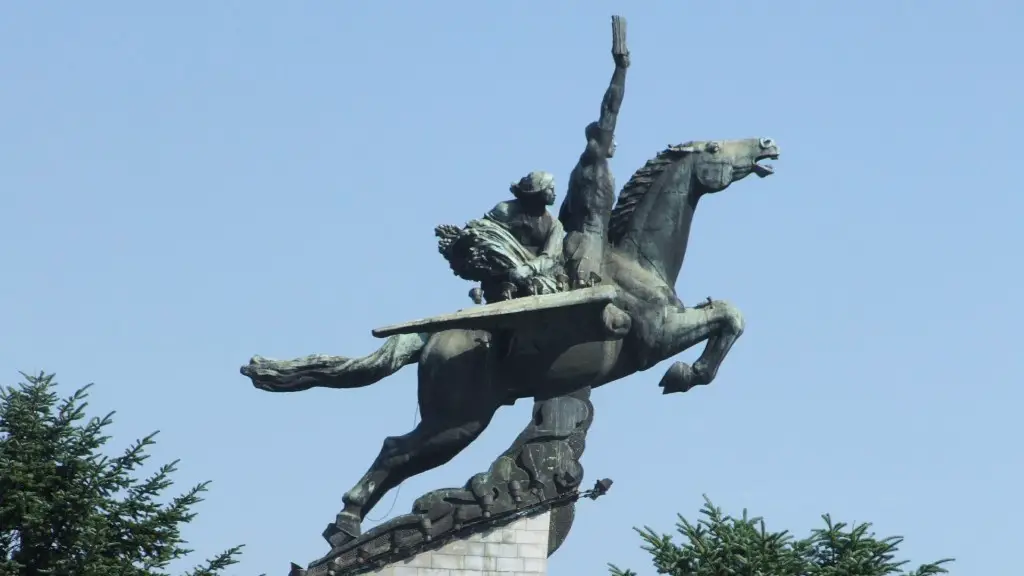Motivations Behind North Korea’s Pursuit of Nukes
North Korea’s pursuit of nuclear weapons is one of the most pressing global security issues of our time, having commanded the attention of world leaders for decades. To understand the ongoing challenge of containing North Korea’s nuclear buildup, it is important to examine the motivations behind the country’s objectives – why are they so determined to obtain nuclear technology?
The primary reason North Korea wants nukes is an enduring sense of insecurity stemming from the Korean War, in which the US filled the role of aggressor. During this three-year conflict, the US bombed cities in North Korea and threatened to use nuclear weapons on the country if it did not comply with their demands. As a result, North Korea feels threatened by the US and its allies, and sees nuclear weapons as a means of protecting itself from a potential attack.
Moreover, North Korea is likely motivated by a desire to increase its regional influence. Acquiring nuclear weapons would provide the country with international prestige, asserting its place as a powerful nation in the global arena. It would also bolster North Korea’s reputation as a hard-line nation and allow the country to cement its authority in East Asia.
From a tactical standpoint, North Korea is leveraging its nuclear program to secure concessions from the international community in exchange for limiting its nuclear ambitions. The country has repeatedly threatened to launch a nuclear attack if its demands are not met, and has used the prospect of a nuclear arms race to gain trade and economic benefits from countries like South Korea, Japan, and the U.S.
Finally, North Korea is also concerned with maintaining its internal stability. The country’s leader, Kim Jong-un, has a strong interest in buttressing his power by cementing his rein with authoritative measures. By striving toward the acquisition of nuclear capabilities, Jong-un will be able to effectively utilize a highly visible means of demonstrating strength and stability, both to the North Korean people and to the outside world.
Historical Context
The roots of North Korea’s nuclear ambitions can be traced back to the Cold War. By the 1970s, the country had already established a research program for developing nuclear weapons technology. Its efforts were fueled by agreements with China and the Soviet Union, who provided assistance and resources in pursuit of a nuclear weapon.
However, North Korea’s true goal of acquiring a nuclear weapon came to light in the early 1990s. As the Soviet Union’s grip on the region loosened, the US took an aggressive stance toward North Korea, leading to the 1994 Agreement between the US and North Korea in which the latter agreed to freeze its nuclear activities.
Despite this agreement, North Korea continued to pursue a nuclear weapon. In 1998, they tested a long-range missile, raising international concerns over the country’s intentions. In 2006 and 2009, North Korea conducted two further tests of nuclear devices– the first successful detonations of nuclear weapons within the country’s capabilities.
Technological Advances and the Current Crisis
The development of North Korea’s missile and nuclear programs has gathered pace in recent years, with Pyongyang having conducted five nuclear tests and dozens of missile launches since 2006. Despite international condemnation, these tests have shown that the country is making considerable advances with its nuclear technology, as it continues to refine its missile and warhead designs.
This development has resulted in a dangerous impasse between North Korea and the US, as the two countries have failed to reach an agreement over the country’s nuclear ambitions. Despite international sanctions, the country has continued its pursuit of nuclear technology, leading to fears of a potential armed conflict in the region.
The Impact on Regional Security
The potential acquisition of nuclear capabilities by North Korea is a serious threat not only to the US and its allies, but also to other countries in the region. South Korea, Japan, and other nations in the Asia-Pacific region are vulnerable to the threat of a nuclear attack by North Korea, and have expressed their opposition to the country’s behavior.
The situation between North Korea and the US has been further complicated by the current US administration’s unwillingness to make any compromises, leading to concerns that a military confrontation between the two sides could be imminent. The US is currently preparing for a possible short-term war with North Korea, in which the US would attempt to cripple the country’s nuclear program and prevent the regime from launching a nuclear strike.
International Reactions
The international community has overwhelmingly condemned North Korea’s nuclear ambitions, with the UN Security Council unanimously agreeing to impose tough sanctions on the country in a bid to stymie its progress.
In response to these sanctions, North Korea has continued to escalate its rhetoric, with Kim Jong-un vowing to develop more missiles and nuclear warheads. Despite this, China has been attempting to de-escalate the situation by calling for dialogue between the US and North Korea, in the hope of reaching an agreement that is mutually beneficial for all sides.
The strained relations between the US and North Korea has led to speculation about the possibility of an armed conflict between the two countries, as the US continues to reject negotiations and instead prepares for a possible military confrontation.
Limiting Nuclear Proliferation
The international community is deeply concerned about the proliferation of nuclear weapons, and fear that North Korea’s acquisition of nuclear technology could lead to a domino effect in which other countries in the region may seek to obtain nuclear weapons in order to protect themselves from potential attacks by North Korea.
The impact of unchecked nuclear proliferation is of great worry, as it would give North Korea tremendous power and influence in the region and force other states to rely on their own nuclear arsenals as a form of defense. In order to prevent a chaotic and dangerous arms race, stricter measures must be taken by the international community to contain the spread of nuclear weapons.
The Role of China
China has historically been North Korea’s staunchest supporter, having provided the country with considerable economic, political, and military support since the 1950s. However, Pyongyang’s recent behavior has caused Beijing to rethink its relationship with the country, as the Chinese government has grown increasingly wary of the prospect of a nuclear war in their backyard.
Despite this, China has been reluctant to take a hard stance against North Korea, as it needs to maintain the country’s political and security stability in order to protect its geopolitical interests in the region. China is in a delicate position, and is attempting to find a balance between its own security interests and its desire to stop Kim Jong-un from acquiring nuclear weapons.
The Need for Compromise
At present, the risk of an armed conflict between North Korea and the US is significant, and neither side is backing down. The only way to resolve this crisis is if both sides make meaningful compromises – the US must accept North Korea’s nuclear weapons program, while North Korea must agree to forgo its ambitions for more powerful weapons.
This will be easier said than done, as both sides are entrenched in their positions and firmly believe that their interests come first. It is essential that the international community tries to broker a compromise that is beneficial to both North Korea and the US – without it, the risk of conflict will remain all too real.
The Need for Disarmament
Ultimately, the only way to avoid a devastating war is for North Korea to completely disarm its nuclear weapons program. The country must be willing to abandon its ambitions and return to the global non-proliferation regime and abide by all international laws and regulations.
To achieve this goal, the US must present a viable and realistic set of incentives to North Korean leaders that must be completed in exchange for their nuclear disarmament. These incentives could include economic assistance, political cooperation, and the removal of international sanctions.
At the same time, the US and its allies must be willing to accept a nuclear-armed North Korea if it is the only way for the regime to remain in power – this may be the only way to avoid a major war and avert a nuclear disaster.
The Role of Sanctions
In addition to negotiations and incentives, international sanctions are an important tool for pressuring North Korea to obey international laws and regulations. By imposing economic measures, including restrictions on the transfer of technology and goods, the international community can limit the country’s ability to advance its nuclear technology and force them to abandon their nuclear ambitions.
These measures have slowly started to have an effect on North Korea’s economy – recent reports suggest that the country is struggling to feed its citizens, while the ruling family is facing an unprecedented level of criticism from both within and outside the country.
However, sanctions have failed to prevent North Korea from advancing its nuclear weapons program, and may even be seen as an act of aggression by the ruling regime, exacerbating the situation. As a result, the US and its allies must focus on balancing the use of sanctions with strategies for engaging with North Korea and finding a peaceful resolution to the crisis.
The Way Forward
At present, it’s clear that the crisis over North Korea’s nuclear ambitions is far from solved. The US must tread carefully in resolving this issue, as there is a danger that any misplaced move could result in a catastrophic conflict.
The only way to make progress is through dialogue and negotiations – the US must not only be willing to talk to North Korea, but must also show a willingness to make meaningful compromises that satisfy both sides. This is the only way to prevent a nuclear war and ensure regional peace and stability.


